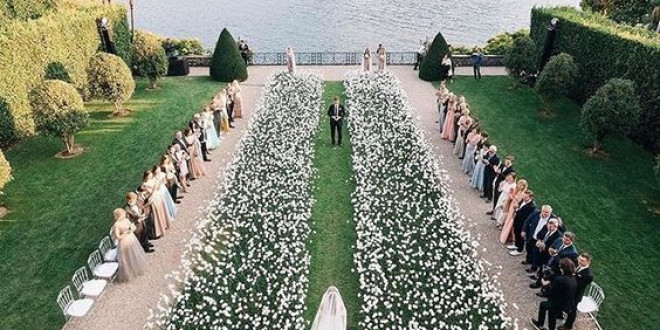One of the very first things you should do before you start planning any part of your wedding is determine your budget. Not only will this help you stick to your bottom line and make realistic decisions about what you can and cannot afford, it’s also information that every single vendor you speak to will ask for. “A budget serves as a roadmap to determining your next steps as far as vendors and décor and is one of the driving forces for how the details of your day will develop,” says Candice Dowling Coppola, owner and creative director at Jubilee Event. “It can become quite easy to get caught up in the excitement of planning and spend more than anticipated, which could require you to modify or eliminate other areas of importance.” Not sure where to begin? Here, wedding planners share their best tips to figuring out your wedding budget from the start.
Know who is or isn’t contributing.
Unless you already know that you’re paying for your wedding on your own, consider talking to both sides of the family to see if anyone is willing or interested in contributing in some way; then, you’ll want to find out what that contribution would look like. “Does having your parents contribute a bulk of the finances for the wedding day also mean that they will want to pick who attends, where the wedding is being held, and other details?” asks Brandi Hamerstone, wedding planner and owner of All Events Planned? “Are you willing to make the trade off for the financial assistance?” These, she notes, are very critical elements to determine before you move ahead with their money.
Establish your values.
The next step, according to Hamerstone, is to decide what your values are around setting a wedding budget. “If you have some money set aside, now is the time to decide if you want to spend it on your dream wedding or you’d rather put it towards a down payment on a house or furthering your education,” she says. “I always advocate spending within your means, since no one wants to be saddled with debt from their wedding no matter how amazing the experience was.”
Determine your top priorities.
After you have a ballpark of what you can comfortably afford to spend on your wedding, decide which expenses are your top priorities (such as an award-winning photographer or a top-rated caterer). “If your priority is to have everyone you love together with the drinks flowing and the dance floor hopping until the wee hours of the morning, then you might want to opt for a venue that lets you party all night, even if it’s not outside in a beautiful garden,” says Hamerstone. “If you can’t imagine compromising on any of those considerations then you may have to come to terms with the fact that the wedding you want might cost more than you were hoping to spend.”
Do your research.
There is no shortage of information readily available on the Internet that can give you the details about average wedding costs. Even better: Coppola recommends asking recently-married couples you know to give you some information about what they spent. “This will allow you to set up appropriate expectations and determine whether or not the choices you have in mind may work well for you,” she says.
Interview multiple vendors.
Coppola suggests speaking with several vendors when looking for a service, since they may all price out differently, even when offering the same or a similar service. “When receiving preliminary quotes, look at what is offered in each packaged service as this varies based on a variety of factors, such as hours on site, number of hors d’oeuvres or beverages within the bar, products received after the wedding (like an album), or level of communication maintained throughout planning, to name a few,” she says. “It’s also important to look at the add ons, or services that could be adjusted based on your guest count or location.”
Consider hiring a wedding planner.
While you might initially think that hiring a planner is just another cost to add to the tab, having someone in charge who knows how to make good use of a budget might be more beneficial than you realize. “Not only will a planner know exactly what you can expect to spend for every single line item, but he or she can even consider scenarios you have not yet thought of based on your venue or guest count,” says Coppola. “With the resources and knowledge at their fingertips, they can recommend professionals who are right within your budget, building you a team of people that you grow to love and trust, which makes all the difference on the big day.”
Decide what you can realistically DIY.
Jessica Janik of The Invisible Bridesmaid, recommends that couples be as realistic as possible when it comes to how much they can DIY or handle leading up to their wedding. “When you realize you might not be able to handle these things you could pay double in last =0minute booking fees or rush delivery, which might put you over budget,” she says.

